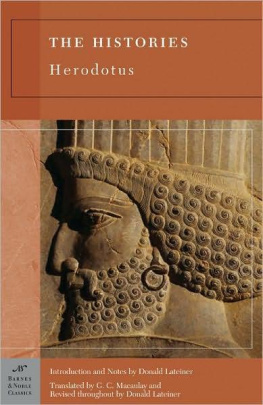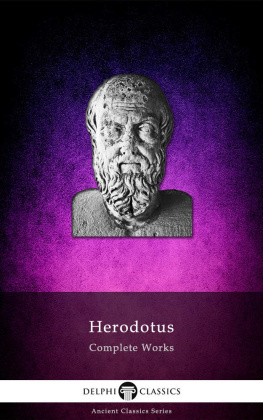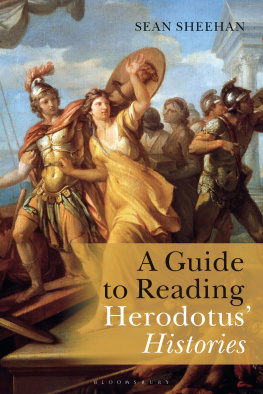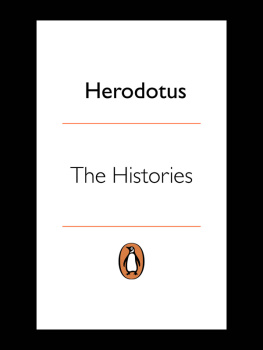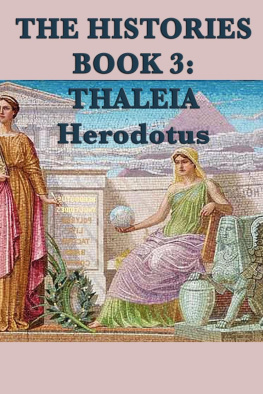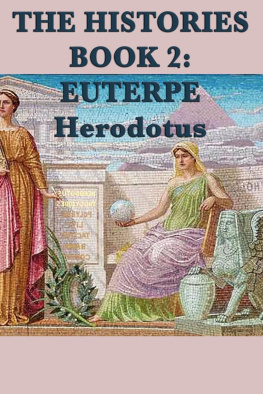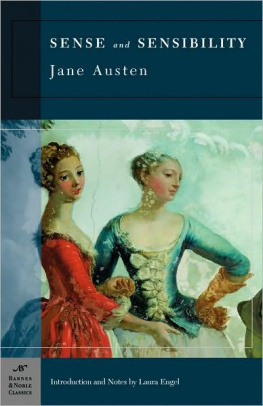Table of Contents
FROM THE PAGES OF THE HISTORIES
Men trust their ears less than their eyes.
(1.8)
When a woman puts off her tunic she puts off her modesty also.
(1.8)
In peace the sons bury their fathers, but in war the fathers burv their sons.
(1.87)
They are wont to deliberate when drinking hard about the most important of their affairs, and whatever conclusion has pleased them, this on the next day, when they are sober, the master of the house where they happen to deliberate lays before them for discussion. If it pleases them when they are sober also, they adopt it, but if it does not please them, they let it go. Whatever they have had the first deliberation on when they are sober, they consider again when they are drinking.
(1.133)
For great wrongs great also are the penalties which come from the gods.
(2.120)
To be envied is better than to be pitied.
(3.52)
Insolence is engendered in him by the good things which he possesses, and envy is implanted in man from the beginning; and having these two things, he has all vice.
(3.80)
The most valuable of all possessions is a friend who is a man of understanding and also sincerely well-disposed.
(5.24)
God strikes with thunderbolts the creatures which stand above the rest and suffers them not to make a proud show; while those which are small do not provoke him to jealousy.
(7.10)
The hastening of any matter breeds disasters.
(7.10)
Misfortunes falling upon us and diseases disturbing our happiness make the time of life, though short indeed, seem long: thus, since life is full of trouble, death has become the most acceptable refuge for man.
(7.46)
Accidents will rule the men and not men the accidents.
(7.49)
Great power is in general gained by running great risks.
(7.50)
These neither snow nor rain nor heat nor darkness of night prevents from accomplishing each one the task proposed to him. with the very utmost speed.
(8.98)
The power of the king is above that of a man and his arm is very long.
(8.140)
The most hateful grief of all human griefs is this, to have knowledge of the truth but no power over the event.
(9.16)
From lands which are not rugged men who are not rugged are apt to come forth.
(9.122)


BARNES & NOBLE CLASSICS
NEW York
Published by Barnes & Noble Books 122 Fifth Avenue New York, NY 10011
www.barnesandnoble.com/classics
It is believed that Herodotus Histories was first published, or recited, between 449 and 447 B.C. G. C. Macaulays English translation of the Histories first appeared in the United States in 1890.
Published in Barnes & Noble Classics in 2004 with new Introduction, Notes, Biography, Chronology, Note on the Text, Appendix, Inspired by the Histories, Comments & Questions, and For Further Reading.
Introduction, Notes, Appendix, Brief Note on the Text, and For Further Reading Copyright 2004 by Donald Lateiner.
Note on Herodotus, The World of Herodotus and the Histories, Inspired by the Histories, and Comments & Questions Copyright 2004 by Barnes & Noble, Inc.
Maps 1-7 are from Boardman, J. N., et al., eds., The Cambridge Ancient History, IV: Persia, Greece and the Western Mediterranean c.525-479 B.c. (Cambridge: Cambridge University Press, 2002). Copyright Cambridge University Press 1988. Reprinted with permission of the publisher.
Map 8 is from Myres, John L., Herodotus, Father of History (Oxford: Clarendon Press, 1953). Based on British Admiralty Chart No. 1530. Reprinted with the permission of the Controller of H.M. Stationery Office and of the Hydrographer of the Navy
All rights reserved. No part of this publication may be reproduced or transmitted in any form or by any means, electronic or mechanical, including photocopy, recording, or any information storage and retrieval system, without the prior written permission of the publisher.
Barnes & Noble Classics and the Barnes & Noble Classics colophon are trademarks of Barnes & Noble, Inc.
The Histories
ISBN-13: 978-1-59308-102-7 ISBN-10:1-59308-102-2
eISBN : 97-8-141-14336-2
LC Control Number 2003114361
Produced and published in conjunction with:
Fine Creative Media, Inc.
322 Eighth Avenue
New York, NY 10001
Michael J. Fine, President and Publisher
Printed in the United States of America
QM
5 7 9 10 8 6 4
HERODOTUS
Little information exists about the life of Herodotus, the Father of History, except what we can glean from his writing. In or around 484 B.c. he was born in Asia Minor in the Carian town of Halicarnassos (now Bodrum, Turkey), at that time a Greek city-state under the rule of the Persian Empire. His father was Greek; the family was a prominent one. Herodotus had a brother, Theodorus, and was related to an epic poet, Panyassis, whose works are lost. Panyassis took part in an uprising against the Persians in 457 B.C. It is thought that at this time Herodotus, perhaps because of his own support for the revolt, left Halicarnassos for the Ionian island of Samos.
Herodotus appears to have traveled widely. He first visited Susa and Babylon in Persia (modern Iran). After 460 B.c. he traveled to Egypt (as far south as modem Aswan), North Africa, the Greek islands and mainland, Scythia (parts of modem Ukraine, Russia, and Kazakhstan), and Colchis (modem Georgia). His modes of travel remain unclear, although his attention to commerce suggests he may have journeyed on merchant ships. Around 449 or 448, he probably would have composed some of the books of his Histories and perhaps began to publish his work in the manner of the timethat is, by reciting it.
Around 447 B.c. he went to Athens, led at the time by Pericles. In Athens, Herodotus would have associated with the orator Antiphon, the musician Damon, the philosophers Protagoras and Zeno, and the playwrights Euripides and Sophocles. There are late reports of Herodotus reading to an audience that included the young Thucydides, who later became the principal historian of the Peloponnesian War. But Herodotus was not a citizen of Athens, and it was difficult to become one. In 443 he joined a group of colonists setting out to found the colony of Thurii in southern Italy and became a citizen of that new town, where he most likely expanded and polished the Histories. He died in Thurii in 414 B.C.
The subject of Herodotus Histories (in Greek the word means inquiries) is the twenty years (499-479 B.C.) of war between Greece and Persia for domination of the Greek world. He broke new ground in looking to past events for the roots of the conflict and incorporating in his accounts surrounding information that shed light on the conduct of the war and the personalities of those who waged it. Unlike Homer, whose epics about the past were based on legend and myth, Herodotus also gathered evidence firsthand from personal accounts and from his observation of places, monuments, and works of art. Herodotus had an appreciation for a good story, and many fascinating tales are sprinkled throughout the Histories, including many the historian himself may not have fully believed.
Without Herodotus Histories, we would have no written record of the pivotal historical events of the Greco-Persian Wars. In addition to that invaluable contribution, Herodotus has given us a lively compendium of ancient personalities and events that we can read for pleasure, amazement, and edification.
THE WORLD OF HERODOTUS AND THE HISTORIES
|
| 560- | Croesus, wealthy king of Lydia, in Asia Minor, conquers coastal |
Next page
